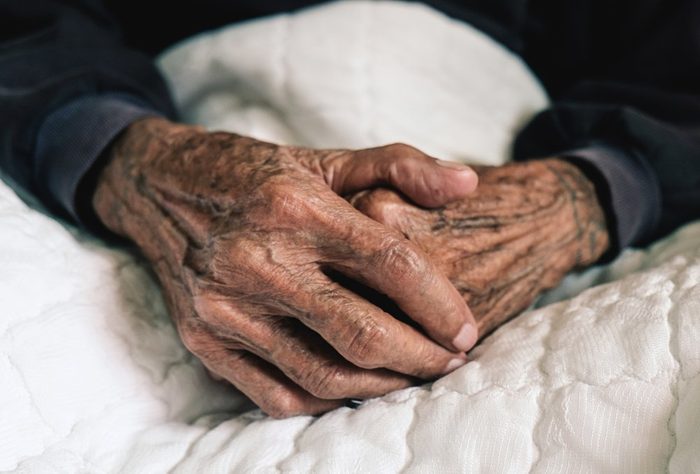
How old do you feel?
That’s one way to interpret the findings one a major new study from the Institute for Health Metrics and Evaluation (IHME). The research was designed to find out which citizens are staying healthiest as they age. It’s an important economic and cultural question: “Age-related health problems can lead to early retirement, a smaller workforce, and higher health spending,” explains lead study author Angela Y. Chang. “Government leaders and other stakeholders influencing health systems need to consider when people begin suffering the negative effects of aging.”
To rank the 195 countries they surveyed, the scientists used Global Burden of Disease data which estimates how much each population suffers from 92 different age-related diseases and disabilities, such as memory loss and chronic pain. Each country was given a score—known as disability-adjusted life years, or DALY—a measurement of the loss of healthy life as people age. For further comparison, the researchers also determined the kinds of diseases that, on average, strike at the age of 65; then they checked how old each country’s population was when they began to experience those diseases. There are at least 15 signs that your body is aging faster than you are.

Aging best #1: Switzerland
Senior citizens in Switzerland had the best DALY score, making them the healthiest in the world, according to the new study. They also could put off the diseases expected to hit at 65 by more than 11 years—in other words, they were 76 by the time they began to experience the illnesses associated with turning 65 for most countries.
Reasons: The country has world-class healthcare, and an almost-perfect Healthcare Access and Quality (HAQ) Index score of 95.6 out of 100. The HAQ measures citizen access to life-saving, quality healthcare. What’s more, the country is one of the happiest in the world, according to the 2018 World Happiness Report by the World Economic Forum. Thanks to social support, a high life expectancy, freedom to make life choices, and low government corruption levels, Switzerland ranks fifth in global happiness, after the Nordic countries of Finland, Norway, Iceland, and Denmark. Decades of research have linked optimism and happiness to lower risks for many diseases.
Here’s what to eat to slow down aging, according to a registered dietitian.

Aging best #2: Singapore
Like the Swiss, Singaporeans are aging so much better than average that they don’t start dealing with the aches, pains, and diseases of an average 65-year-old until they reach 76. Americans are just barely above average in this department—they manage to delay 65-year-old health woes for about three years when they turn 68.
Reasons: Excellent health care again comes to the rescue: In Singapore, there’s a unique public/private system that the World Health Organization ranks 6th. (By way of comparison, the United States’ ranked 37th.) Singapore’s government also takes a very “hands-on” approach to the health habits of its population. Its Healthier Dining Program makes it cheaper to order healthier options at many places while eating out, and a National Steps Challenge gives free step counters to citizens and offers cash and prizes to those who succeed at increasing their physical activity, according to the BBC. Find out the science-backed signs you could live to be 100.

Aging best #3 and #4: South Korea and Japan
According to the IHME study, seniors in South Korea and Japan are able to delay the aches and complaints of aging by about ten years compared to countries near the mean—like the United States.
Reasons: Japan and Korea have the lowest levels of obesity in the world—just 3 and 5 percent of the population respectively, compared to the global average of almost 20 percent, according to the Organization for Economic Co-operation and Development. The countries also have lower-than-average rates of cardiovascular disease, perhaps due in part to traditional cuisines that feature heart-healthy fish and gut-protecting fermented foods such as kimchi and miso. Okinawa, Japan has long been known as one of the globe’s five “Blue Zones,” regions of the world where people commonly live active lives up to age 100 or beyond. “I would say that the success of Blue Zones regions is nearly 60 percent about their diet,” says Dan Buettner, the award-winning journalist who first described the Blue Zone phenomenon. Find out what you should (or shouldn’t) be eating on the Blue Zones diet.

Aging best #5: Italy
Despite a fondness for smoking, Italians still age more slowly and healthfully than most other nations around the globe, including the United States. Like citizens of the other countries in this healthy-aging top five, Italian seniors put off age-associated illnesses for almost a decade longer than the global average.
Reasons: Like Switzerland, Italy has a near-perfect Health Access Quality score, meaning its citizens are generally able to get excellent, life-saving care when they need it. The famously healthy Mediterranean Diet—traditional to Greece, Southern France, and parts of Italy—is another key to the good health of Italy’s citizens. The country is also the original home of the “slow food” movement that fought back against encroachment by fast-food restaurants by emphasizing home cooking and food quality over convenience. “Eating fast is not at all part of our culture,” Italian food expert Marco Bolasco told journalist Amy S. Choi. “Our meals are relaxed, even during lunch break.”

Aging worst: #1 Papua New Guinea
The IHME study revealed an enormous gap in healthy aging of populations around the world. The citizens of Papua New Guinea, a nation of seven million in the South Pacific, are burdened with 475 percent more illness and disability compared to U.S. citizens. Health conditions are so poor in fact, that life expectancy is only 61 years in women and 56 in men, compared to 81 and 76 in the United States.
Reasons: Despite the tiny nation being rich in natural resources like copper, gold, and oil, malnutrition is the number one factor driving high rates of death and disability there, according to the IHME. What’s more, the medical system is in collapse: Medical facilities there lack basic equipment and medicine, reports the New York Times. Rates of preventable and treatable diseases such as polio and tuberculosis are soaring. “It’s like someone lit a paper castle where everything is on fire,” Dr. Anup Gurung, a public health specialist with the World Health Organization, told the Times.

Aging worst #2–5: Marshall Islands, Vanuatu, Afghanistan, and the Solomon Islands
Sadly, older people in these nations typically develop age-related health problems 11 to 14 years earlier than the global average. In other words, they “feel” 65 by the time they’re in their early 50s, according to the IHME study. The Marshall Islands, Vanuatu, and the Solomon Islands are island nations in the Oceania region of the world that also includes Papua New Guinea, New Zealand, Australia, and Fiji.
Reasons: Poor healthcare quality, poverty, and lack of education conspire to make the citizens of these four countries age faster than any others except for those in Papua New Guinea. In the Middle Eastern country of Afghanistan, citizens get the least education of any of the bottom-five countries: an average of just 2.7 years. Sadly, “conflict and terror” are the leading causes of disability in Afghanistan, followed by drug use, according to the IHME. Next, check out these 35 health secrets your body is trying to tell you.
